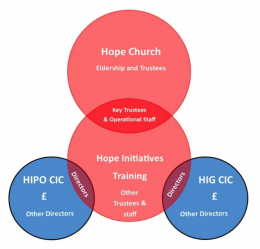 Nick Priggis continues his series on Social Enterprise by looking at the place of entrepreneurs within the local church.
Nick Priggis continues his series on Social Enterprise by looking at the place of entrepreneurs within the local church.
The church has an opportunity in these days to become an incubator for social transformation and enterprising business. There is opportunity for the church to express herself in a similar enterprising fashion due to a growing similarity with the context in which the early Quakers found themselves, that of a growing prohibition of Christians in public life.
However, to be such an incubator will take creativity and faith for it to happen through and alongside the church. And perhaps it will require a new breed of church leader to facilitate its growth.
Identifying entrepreneurs in the church
For too long the church has been suspicious of the business entrepreneur. Instead of utilising their drive, creativity and leadership, the church, has in general favoured a more pastorally-minded gifting. Although the pastoral gift is central to the healthy life of a church, what is needed in equal measure is leadership which releases ministry. Leaders don’t need to be entrepreneurial themselves but they do need to be secure enough to allow those who are business-minded to express themselves and see their gifts as gifts to both the church and the Kingdom.
A vision for Kingdom-minded businessmen and women needs to be retold in light of those who have gone before, such as the Moravians and Quakers. The Lord has equipped His church with everything our society needs. We may not have a Big Society but we do have a Big Church. In the days to come the church needs entrepreneurs and business people who are disciples of Jesus to be unleashed in new and effective ways to meet the growing needs in both our nation and amongst the nations.
 Developing organisations that partner together
Developing organisations that partner together
The challenge for the relationship between churches and Social Enterprises is that churches are not called to make money; Churches are called to make disciples. The church is not a business nor is it primarily an organisation; the church is a family. Therefore, there is a fundamental dilemma about churches running businesses. Indeed, I don’t believe a church should run businesses. However, I do believe that churches should encourage gifted businessmen and women to run Kingdom-focused businesses.
I also believe that the outcomes associated with Social Enterprises run by disciples of Jesus can, indeed must, be an investment in the coming Kingdom. The way we have kept Hope Church focused on making disciples is to develop separate organisational and legal entities with distinct aims and objectives to that of the church, yet locked into the missional vision of the local church through key strategic decision-makers remaining in place.
Celebrating discipleship-making in the workplace
We enthusiastically celebrate and encourage the disciple-making process in the workplace. The church is a catalyst and an encouragement to Christians to make disciples wherever they find themselves, not least in the workplace. Part of the role of Social Enterprise is to redeem God’s creative plan for work. Helping people gain joy and purpose through work is a crucial aspect of creation’s order. Christian Social Enterprises have the opportunity to provide meaningful work experience and employment for people, treating them with the dignity and self-worth they were created for.
Here are some questions for you to consider:
- How might business-minded disciples be utilised more effectively towards Kingdom-focused ministry including Social Enterprises?
- What might a partnership look like between the church and a Christian Social Enterprise?
- How can the church develop discipleship in the workplace?
Next time I will be exploring the raising of resources through Social Enterprises.
